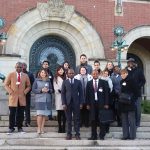
Posted on: 3 March 2017
By: raymonm
No Comments »
Filed under: Uncategorized
A bonus for LLM students taking the course this year was the opportunity to visit some of the main international institutions in The Hague, during two tightly packed days there in January 2017. The group of sixteen participating in the trip included students from Bangladesh, Brazil, Bulgaria, China, Italy, Kenya, the Netherlands, Nigeria, Pakistan, Saudi Arabia, Uganda and the UK.
The surprise of the trip for me was our first stop, the Organisation for the Prohibition of Chemical Weapons. We had touched on its work in International Humanitarian Law but it was probably the institution with which, as a group, we were least familiar. The talk from its Senior Legal Officer, Grant Dawson, was excellent and what was striking is the OPCW’s success in backing up a treaty with a verification mechanism which has achieved real results in substantially reducing chemical weapons.
We spent the first afternoon at the Peace Palace, stunning inside and out. It houses the International Court of Justice, the principal judicial organ of the United Nations, to which states can bring their disputes. We visited at an exciting time, Costa Rica and Ukraine had just instituted proceedings against Nicaragua and the Russian Federation respectively.
The Permanent Court of Arbitration, also based at the Peace Palace, was established in 1899 as the first global mechanism to facilitate the settlement of inter-state disputes. We had a talk from one of the Assistant Legal Counsel and it was interesting to hear something of the PCA’s evolution over the years to its position now, offering a flexible framework for arbitration.
Our second day moved focus from state level to individual criminal proceedings and began with the morning at the International Criminal Court. As well as a talk and mini-tour we were able to sit in the Public Gallery and see the early stages of the Prosecution’s presentation of its case in the trial of Dominic Ongwen, alleged Brigade Commander of the Lord’s Resistance Army. Seeing the process in action added an extra dimension to our studies. We saw the care the Court takes to protect witnesses and the interventions of the Presiding Judge, Judge Bertram Schmitt, to ensure the Prosecution’s examination did not pre-empt future testimonies.
We crossed town for our final visit, to the International Criminal Tribunal for the former Yugoslavia. Matthew Gillett, a Trial Attorney at the Office of the Prosecutor, gave us a fascinating insight both into the history of the Tribunal and the practical challenges he and his colleagues have faced.
All of the institutions we visited offer internships and for anyone who was considering applying it was very useful to see what these might involve.
As a whole, the trip added substantial value to our studies and we appreciated the institutions facilitating our visits and the time given by their staff. The trip was also a chance to get to know better our fellow students and to have what we all agreed was an amazing time. We are grateful to the Law School and other Westminster staff for supporting the trip.
Monique Law
LL.M International Law student
Find out more about our LLM in International Law here
Posted on: 28 February 2017
By: raymonm
No Comments »
Filed under: Uncategorized
Having been to an array of events held by law firms over the 3 years of my undergraduate study, none have quite compared to the personal and down to earth approach taken by Craig Sharpe when providing us with insight into Darlingtons LLP. From my personal experience, I feel as if many undergraduates are likely to be attracted to international firms due to their generous salaries, secondments abroad and fancy glass buildings. Tunnel vision here ultimately leads to many undergraduates overlooking small/mid-sized firm. The events held by regional firms are quite robotic in that they often begin with a short presentation on the overview of the firm, a question and answer panel and some networking. Oh, and let’s not forget the free drinks. The problem with these events is that even though you get to meet and talk to a variety of individuals in the firm, you’re just a face in a crowd of many students and so it can be hard for you to stand out.
What made the event at Darlingtons special was that Craig took a more personal and informal approach. He didn’t give the usual speech on how the legal profession has become very competitive, instead he took us through a journey of his 30 years working in law and gave us a comparison of what he found good and bad about working at big firms and as a lawyer in general. He then moved on to give us an insight into how he sees the legal profession will evolve to be like in the future and gave us a visual representation of on the number of lawyers who have received there right to practice. The presentation given didn’t just focus on Darlingtons as a firm. It allowed enough information for a general overview of the profession in addition to advice for doing well in an application to a law firm. Not only did this give some context towards the profession, it also allowed to appreciate the benefit and disadvantages of being a solicitor whether it be in a big or small firm.
The legal profession has stereotypically been labelled as quite mundane and boring but the event held by Darlingtons broke that stereotype. It was a very social and enjoyable presentation with plenty of time for asking questions and enough information to help students to make an informative decision about their steps after university. One thing that would make the talk even better would be to have another member or even a trainee of the firm share their experience as a lawyer so students get a more broader view of the legal profession as well as the firm.
-Aadil Shara, University of Westminster
Posted on: 25 April 2016
By: raymonm
No Comments »
Filed under: Uncategorized
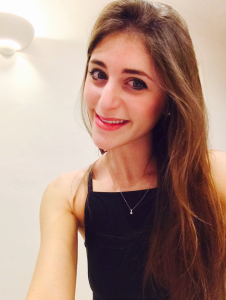
I chose to study at the University of Westminster because it offers the unique opportunity to study a law degree and the Legal Practice Course in a seamless, four-year course.
I am grateful for the friends that I have made at the University. I feel that studying in the city has given me the opportunity to meet a more diverse range of people from all different walks of life and from different parts of the world. We have shared our experiences – both the high’s and the low’s – and watched as each and every one of us have progressed and discovered which area of law or which career path we wish to go into. There is a real sense of community at the University and the tutors are always there to offer their support and guidance, especially now that we are approaching the final stages.
The thing that I have found the most challenging throughout my degree was drafting coursework to the standard required at undergraduate level. At the start, I struggled to focus my research on the essay title and instead, found myself including irrelevant and unnecessary points. In order to improve on this, I found it helpful to speak to my tutors to discuss my work. I also decided to make use of the legal skills textbooks available in the library, as well as signing up to any tutorial classes for Westlaw or LexisNexis. By seeking help, I was able to identify my weaknesses. I believe that University is about being self-motivated throughout the entirety of the degree and to make the mistakes at this stage so that you can learn from them in the future.
Over the past four years, I have spent a lot of time applying for various positions. Initially, I was not overly picky with where I wanted to be placed; I simply wanted to build on my C.V and gain practical experience. Although I think it is important to show consistency throughout your C.V, I feel that by keeping an open mind about the law firm in which I wanted to be placed, and the sector that I wanted to work in, I was able me to make a well-informed and reasoned decision about my chosen career path. I have gained a wealth of experience in different legal sectors; from local law firms specialising in both private and commercial law, to completing a mini-pupillage in Chambers. For me, it all culminated in my work experience at Eversheds LLP. From the moment I walked through the door, I knew that this was the law firm for me. I decided to apply for a training contract with the firm, and after an emotional and stressful 6-month process, I was delighted to hear that I had been successful in securing a place. What is even better is that, because I am currently studying my LPC, I have been asked to start my training in September 2016, rather than in 2017.
Looking back, I feel that what set me apart from other candidates was my enthusiasm towards working for the firm. I showed a real interest in the work that the firm does and an understanding of the key principles that the firm as a business, and the lawyers as individuals try to uphold. One principle in particular is that Eversheds is renowned for applying its’ innovative flare when it comes to delivering its’ products and services to clients around the world. Knowing this, I made sure to give examples throughout the process of when and how I have demonstrated this characteristic.
Posted on: 14 April 2016
By: raymonm
No Comments »
Filed under: Work placements
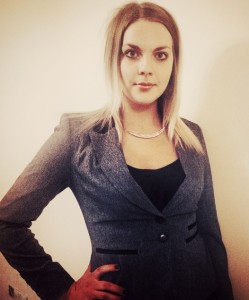
Each year JD Spicer Zeb, a prominent London Criminal Law Firm, offers a work placement to the student who received the highest mark in the Crime module. This year this was won by Sophie Smith a 2nd year LLB student.
During my time at JD Spicer Zeb, I attended Court on numerous occasions which was the most exciting part of the placement. I attended three different courts:
Highbury and Islington Magistrates Court
At Highbury Court, I spent time shadowing a solicitor, who was acting as an advocate for numerous clients. I spent time reading the case background, and sitting in on client meetings. I was also able to sit in the court room as the case was decided. This experience gave me a real insight into the work of a solicitor at court. I learnt about dealing with clients, courtroom etiquette and fitting each client into a busy schedule.
Woolwich Crown Court
I spent the day in the Public Gallery at Woolwich. I listened to two cases, one of which was a trial. This was was a fantastic experience, watching the barristers present their cases and listening to how the defendants were questioned. It was an excellent opportunity to see how knowledge I have learnt during my time at University was actually applied in a practical sense in the courtroom.
Harrow Crown Court
At Harrow Crown Court I worked with a Barrister on an important case. The trial was due to start the day I arrived, but due to a number of hold ups the trial was re-scheduled for the following day. However the experienced I gained here was still invaluable. I was able to meet the client and sit in meetings, to discuss how he would manage himself in the Courtroom. I also learnt about scheduling of cases, and how in reality cases do not always pan out as expected due to delays and other various mishaps.
In the Office
I spent a week of my internship in the Kilburn Offices, with various members of the firm. I worked with paralegals and trainees and also undertook important work for partners.
Some of the tasks I was involved in were:
Letter Writing: I spent time learning from paralegals how letters should be constructed and amended, which some may consider less exciting than the court visits. However this still provided invaluable experience of the basic skills required in practice.
Filing: I spent the first two days, photocopying and organising case files for various solicitors. This had to be done in a specific way to ensure the barrister/solicitor could use the documents effectively. Again this provided me an insight into the necessary organisational skills required in practice.
Case Reports: During my time I was also asked to construct a case report for a solicitor on an important case he was working on. I was given a two-day deadline as the Solicitor needed to meet with the client. This proved challenging as there was a significant amount of information to get through and summarise. However it was exceptionally interesting and I was able to read all elements of the defendant’s case from police interviews to witness statements.
Client Meetings: I also spent time with a trainee sitting in on a client meeting where the trainee discussed work I had created for the client. The work I had created for this meeting took a few hours, and involved cross referencing two different lists.
Out of the Office
During my first week, I was entrusted to deliver case files I had put together to a chamber in Chancery Lane. I was simply given an address and no time limit was imposed. This highlighted to me the trust given by the solicitors, and the high expectations of each person working for JD Spicer.
Whilst undertaking the internship with JD Spicer I was also able to get involved and feel part of the team. Each person I met was welcoming and willing to help with any queries I had no matter how busy they were. I also went for lunch on Friday, with the paralegals and other work experience students, which helped me, settle in and feel part of the team.
Overall this experience was fantastic and provided me with first-hand experience which I could use in my future career. I was afforded a significant amount of responsibility early on and was exposed to numerous cases and allowed access to all case details.
I would recommend this experience to anyone who is looking to understand Criminal Law in practice, and would like to know what a solicitors working week really consists of.
Posted on: 12 April 2016
By: raymonm
No Comments »
Filed under: Uncategorized
Westminster Law School’s interdisciplinary Law Review written by students and graduates from University of Westminster and other universities.

Posted on: 10 September 2015
By: raymonm
No Comments »
Filed under: Meet the academics
Please describe yourself and your role in a few sentences?
I have joined the Law School as Senior Lecturer in Property Law and hope to share my passion for all things property with the law students on a number of modules.
What is your area of academic interest?
My research is interdisciplinary, incorporating aspects of tort, land law, environmental law, and social policy, but it primarily focuses on the power dynamics evidenced in property-based disputes. My doctoral thesis, entitled ‘A Foucauldian Exploration of the Statutory Authority Defence to an Action in Private Nuisance’, uses the work of Michel Foucault as a framework for contextualising these dynamics in relation to the state-endorsed infringement on private property rights for infrastructure development.
Please tell us a bit about the teaching that you are involved in?
I have previously taught on built environment and construction undergraduate and postgraduate programmes, and I hope to share this practical property approach with students in the Law School.
What was your first job?
I was a fitness instructor on cruise ships and worked on a number of luxury liners, including the QE2!
Where did you work before coming to Westminster?
I was a lecturer in the School of Law at the University of Essex.
What has been the highlight of your career to date?
Securing funding to work on an education project close to my heart: Producing a pilot for an online problem-based learning project for student researchers and practitioners.
What advice would you give students during their studies and after graduation?
Both during and after – Don’t be afraid to get in touch with people and ask for advice, help, support, or opportunities to attend events.
What advice would you give students considering studying this subject?
Be tenacious – the road ahead will take perseverance, patience and determination!
What are your interests/leisure activities?
I have a passion for live music and, as my husband is in a band, I get to indulge it most weekends. I also have a love for the home-made and keep my creative side alive by baking, sewing, knitting and crocheting.
Posted on: 29 July 2015
By: raymonm
No Comments »
Filed under: Law and Popular Culture
This month marked the long awaited rebirth of our wonderful cinema, now renamed the
Regent Street Cinema. For a long time for staff at the University it was known as The Old Cinema, and has had various names over the years, as will be clear when the book about this,
The Magic Screen, is published in June 2015. I was lucky enough to be involved with the book, and also have had some small involvement with the Cinema over the years in various guises, see for example some previous blog posts
here and our exhibition
Classified. The last few years have seen things really develop apace – a lot of the credit for this must go to our Vice Chancellor – not only has he seen the Cinema as an important project in its own right but has really seen fit to celebrate our heritage, including fully supporting the
Archive and our excellent archivists. This was something which had previously been under-acknowledged and utilised and they do some brilliant work – see for example their excellent online exhibition on
World War One and the Polytechnic and recent exhibition of
gig posters. They have of course also been heavily involved in the Cinema redevelopment. The Cinema itself is a beauty ands hopefully lots of people will come to visit it. Obviously opening a single screen cinema in the West End, and one that whilst it is a commercial cinema also is heavily linked into the University’s educational ethos, which undoubtedly makes it a challenge to programme. That said, the initial programme has been superb – eclectic and imaginative in equal measure, and credit must go to the cinema director,
Shira MacLeod for this.
The opening night saw the premiere of Lambert and Stamp for example, with Terence Stamp giving a Q&A and in the days since the programme has constantly surprised. I was lucky enough to Chair a Q&A on excellent new film Bypass. Its a hard hitting and great film, and provoked a vehement discussion. There is certainly a political element to it, and the team behind it were very keen to ensure it was released before the election. As it happened we screened this a week after the election, and the Q&A commenced almost exactly a week after the polls had closed.
 |
| Bypass; theatrical poster |
We were privileged to have Samm Haillay, the Producer; David Procter, the Director of Photography, and Noel McLaughlin, a media academic and massive supporter of the film in attendance, and the first question, based upon this post election scenario, elicited some passionate audience responses. In fact, we did not have much time for any of the other questions I had prepared (including some classics on genre bending, finance and a discussion of Director Duane Hopkin’s father’s statement that ‘academics don’t live in the real world, they are either mentally or sexually frustrated’ that I was going to put to David and Noel, the 2 academics on the panel) and as much of the discussion was taken up with audience and panel thoughts on how the film fitted into this and some debate around who the audience for the film was and whether it could reach further. The consensus was that it was an important and passionate film that deserved, and needed, to be seen. The point was also made that it was beautifully shot and it was a privilege to have David in attendance although time constraints meant we could not drill down on this during the Q&A, but luckily we eventually found somewhere to carry on the discussion afterwards, nothwithstanding the big queue at theSocial.
I’ll post on the Cinema again as its journey continues, and really hope that as many people as possible get to visit this historic space and see some of the brilliant films we are screening. Also, try and catch Bypass – whilst I read it as a film about hope, Samm wanted it to be seen as a call to arms, and reflecting on it again I can see this as a clarion call and a touchstone for a different sort of hope. I’ll end this as the film does, with the quite marvellous Soldier On by Richard Hawley and with a thought for the late Chris Collins, to whom the film is dedicated.
Posted on: 18 March 2015
By: raymonm
1 Comment »
Filed under: Events, Uncategorized
Westminster Law School students encouraged ‘to go for it’ by judges and alumni.
Westminster Law School was thrilled to host an inspirational evening with nine high-profile judges who discussed high-points of their careers and afterwards joined students and staff for a canapé and champagne reception.
After an opening speech by Head of Westminster Law School, Liz Duff, the judges gave an overview of their careers and shared tips for success. This was followed by a Q&A session where the judges and students discussed topics ranging from ethical dilemmas to equal opportunities as well as practical information on gaining work placements. Some of the judges even offered to provide work shadowing opportunities for some of the students.
Caroline Hamilton, Chief Parking and Road Traffic Adjudicator for London, said: “If you follow my example all you have to do is to keep going … I don’t give up.” She continued: “One of the ways to have a stable income is to achieve a judicial appointment and, looking at the different types of people that we have here, it’s something that is an open opportunity for all sorts of people to take up. So don’t ever think that ‘no, I cannot do that!’ Yes, you can do that! We are certainly living examples of that.”
District Judge Philip Gillibrand, who specialises in crime and family and who is also a Diversity and Community Relations Judge, further encouraged the student audience to live up to their potential: “What really matters tonight is you and your careers, and how you go about tackling them. Whatever your background, whatever your problems, this is an inclusive society …We want you all to be involved in the legal profession, involved in the judiciary. Be determined. Seize the day. Give it a good go. Don’t give up. If you are confronted with a failure, try again. And try again after that.”
The judges who attended the evening were:
- The Honourable Mr Justice Richard Arnold
- Her Honour Judge Jane Probyn
- Godfrey Cole, former Dean of the Polytechnic of Central London (the predecessor to Westminster Law School), Tribunal Judge, Judge of Upper Tribunal
- District Judge Philip Gillibard
- Henry Michael Greenslade, Lead Adjudicator Parking on Private Land Appeals
- Caroline Hamilton, Chief Parking and Road Traffic Adjudicator for London
- District Judge (MC) Tan Ikram, Deputy Lead Diversity and Community Relations Judge
- His Honour Judge Philip Sycamore
- Her Majesty’s Coroner Andrew Walker
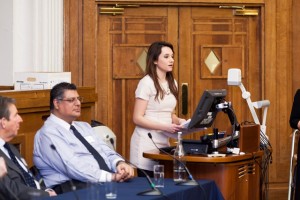
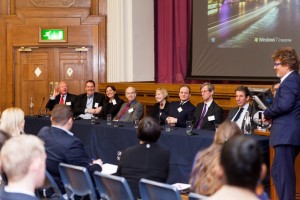
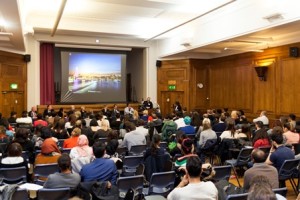

Posted on: 17 March 2015
By: raymonm
No Comments »
Filed under: Meet the academics
Leading child law expert and international child abduction specialist, Professor Marilyn Freeman, has joined Westminster Law School as Principal Research Fellow.
Professor Freeman is co-director of the International Centre for Family Law, Policy and Practice (ICFLPP) which will be affiliated to the University of Westminster, and which she co-heads with family law and dispute resolution specialist Frances Burton. With the support of its patron, Baroness Hale of Richmond (Deputy-President of the Supreme Court of the United Kingdom), ICFLPP works to develop multi-disciplinary cross-jurisdictional approaches to the challenges of international family law and to engage in collaborative research on these issues.
Professor Freeman joins the University of Westminster from London Metropolitan University where she was Reader in Family and Child Law, before becoming Professor of Family Law in 2010. Professor Freeman said: “I am very excited about joining Westminster Law School as Principal Research Fellow and the opportunities this presents for working with colleagues to develop creatively our mutual research interests, and to mine the interface between our various disciplines, in a way which both supports and enhances the student experience at our institution.”
Elizabeth Duff, Head of Westminster Law School, said: “Marilyn Freeman brings an enormous amount of expertise and experience to Westminster Law School; her research and passion for teaching are threads that run through all her work and these resonate with the vision of the School as we aspire to make an impact on the wider community through the work of our Student Law Clinic and internationally recognised research and teaching.”
Professor Freeman was called to the English Bar (Middle Temple) in 1986 after completing an LLM at Kings College, London. Her research efforts and practical work have focussed on areas such as international child abduction, forced marriage and relocation – she gained her doctorate in international child abduction. She is widely acknowledged as a leading expert in these areas in which she remains actively involved. She held the position of Head of the reunite Research Unit for many years, and has undertaken several ground-breaking research projects, some supported by government departments such as the Foreign and Commonwealth Office and the Ministry of Justice, including research into both international child abduction and relocation, most recently publishing her research into the long-term effects of child abduction in December 2014.
ICFLPP is holding its triennial conference entitled Culture, Dispute Resolution and the Modernised Family on 6-8 July 2016 in London. Professor Freeman and Frances Burton organised two international family law conferences in 2010 and 2013, which attracted widespread global support and recognition. For further information, please visit www.famlawandpractice.com.
More about Westminster Law School.
Posted on: 6 February 2015
By: raymonm
No Comments »
Filed under: Uncategorized
Jifree Cader: studied the LLB at Westminster
Jifree Cader grew up in Streatham, south London and completed his Law LLB at the University of Westminster in 2005. His course included 100 hours of work experience during his second year, which he says gave him a real advantage in the employment market when he applied for vacation schemes and training contracts.
During his training contract, Jifree worked through the credit crunch and subsequent recession and, as a result, legal advice for insolvency and restructuring was in high demand. This is now his specialist area as an Associate at Kirkland and Ellis LLP. Jifree took an active part in the extra-curricular activities on offer at the School of Law, including the client interviewing, negotiation and mooting competitions. These proved invaluable talking points at his training contract interviews and were a good introduction to the tough questions he faces as a lawyer now.











